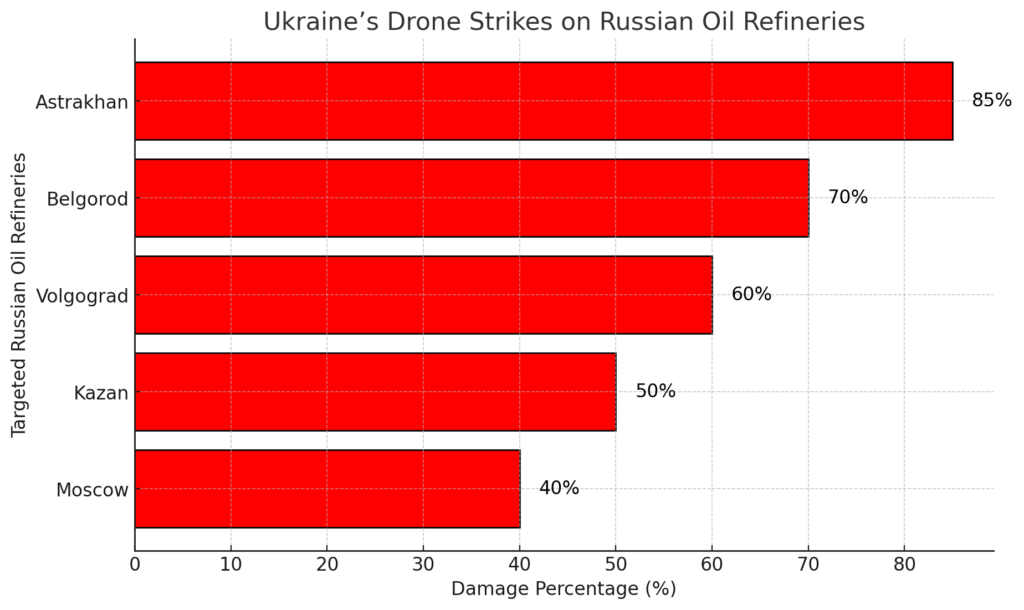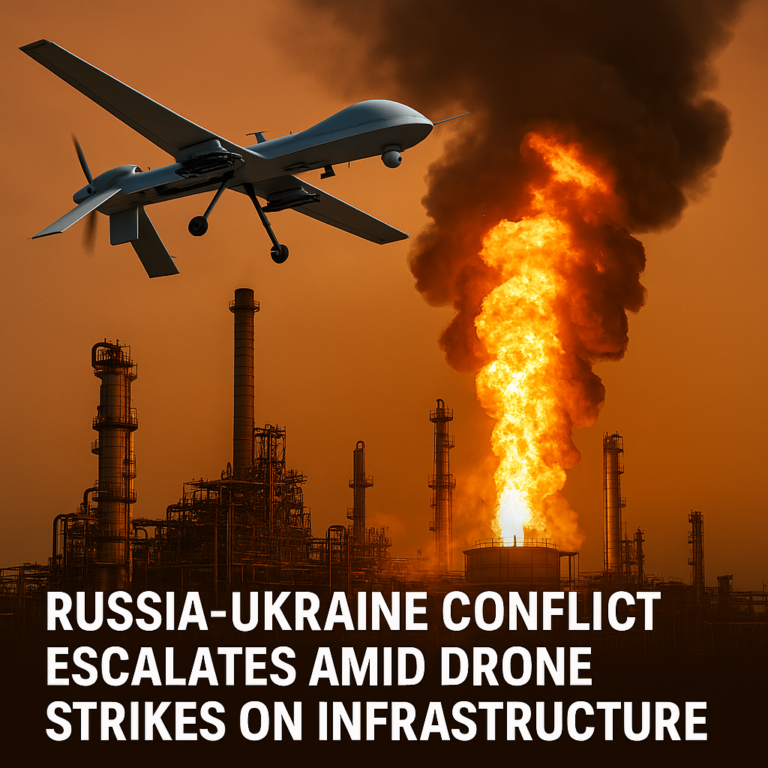
A Ukrainian drone strike targeting a key Russian energy facility, causing massive explosions and fire.
Ukraine’s drone attacks have become a game-changer in the ongoing war. As a result, Russia is struggling to protect its key energy infrastructure. In fact, Ukraine drone attacks are now severely impacting Russia’s energy sector.. By strategically targeting oil refineries, gas plants, and key energy facilities, Ukraine has inflicted significant economic damage on Moscow. These attacks are not just tactical; rather, they are a deliberate effort to weaken Russia’s war economy. Therefore, the Kremlin is forced to respond with countermeasures.. by disrupting its primary revenue sources—oil and gas exports.
This article delves into how Ukraine’s drone warfare is reshaping the conflict, analyzing its economic impact, military strategy, and the broader geopolitical consequences.
Read more about the latest updates on Suchak News
Ukraine’s military strategy has taken a decisive turn with the extensive use of drones, particularly targeting Russia’s oil refineries, gas plants, and energy infrastructure. These attacks have significantly impacted Russia’s economy, causing widespread damage and financial losses. The drone strikes are not just tactical assaults; they are part of a broader plan to cripple Russia’s war machine by attacking its primary revenue sources.
This article explores how Ukraine’s drone strategy is affecting Russia’s energy sector, the economic consequences for Moscow, and the long-term geopolitical implications.
Read more about the latest updates on Suchak News
Ukraine Drone Attacks: A Shift in Military Strategy
Since the beginning of the war, Ukraine has used various military tactics, including artillery strikes, special operations, and surprise raids. However, none have had the same strategic impact as drone warfare. By using long-range drones that can strike over 1,500 km deep into Russian territory, Ukraine has gained a strategic advantage. As a result, Russia must divert additional resources to defense., Ukraine has gained a strategic advantage. Consequently, these attacks are forcing Russia to reallocate resources., Ukraine has been able to directly hit critical oil and gas facilities, cutting off a major portion of Russia’s war funding.
Key Reasons Behind Targeting Russian Energy Facilities
- Economic Warfare: Oil and gas account for 40% of Russia’s federal budget and 60% of its total exports.
- War Funding Disruption: Before the war, Russia earned between $500 million to $1 billion daily from global oil and gas sales.
- Winter Crisis: With plummeting oil refinery production, millions of Russian citizens now face electricity and heating shortages.
- Western Sanctions Amplification: Sanctions alone were insufficient; drone strikes accelerate the collapse of Russia’s energy dominance.
Major Ukraine Drone Attacks on Russian Oil Refineries
Astrakhan Gas Processing Plant Attack
One of Ukraine’s most impactful attacks occurred at the Astrakhan gas processing plant, a key facility of Gazprom. This facility processes 12 billion cubic meters of gas annually, supplying gasoline, diesel, and sulfur for explosives. The explosion and fire caused massive damage, forcing the plant to suspend operations.
Impact of the Attack
- Halted production of 8,000+ tons of gas condensate daily.
- Forced plant employees into shelters, indicating pre-attack intelligence.
- Disrupted Russian fuel supply, worsening the country’s energy crisis.
Ukraine’s high-frequency drone strikes are causing continuous economic damage, reducing Russia’s energy output by an estimated 14% since June 2024.

Ukraine Drone Strikes and Russia’s Energy Crisis
Russia’s energy industry is collapsing under pressure from drone attacks and sanctions. As of 2025, Russia has lost over one-third of its oil export volume. The financial losses are staggering, and even the Kremlin’s efforts to redirect oil to Asia have failed to compensate for the damage.
Key Economic Consequences
- Revenue Decline: Russia’s oil and gas revenues dropped 26% to $18 billion in 2024.
- Production Cuts: Ukraine’s strikes have reduced refinery output by 14%.
- Infrastructure Collapse: 80% of Russia’s energy infrastructure is outdated, worsening the crisis.
- Gazprom’s Financial Disaster: In 2023, Gazprom posted a $7 billion net loss, the first in nearly 50 years.
Russia’s citizens are bearing the brunt of this crisis. Consequently, many are demanding solutions from their leaders.. As a result, discontent among the public is growing. as heating shortages increase, particularly during the harsh winter months.
Ukraine’s Drone Warfare: Putin’s Budget vs. Energy Crisis
With ongoing drone attacks, President Vladimir Putin faces a strategic dilemma. Hence, he must choose between sustaining the war effort or addressing domestic concerns.: Should he prioritize war spending or focus on stabilizing Russia’s domestic energy crisis?
- If he diverts funds to energy recovery, the war effort may suffer.
- If he continues war spending, the Russian public will suffer harsh winter conditions.
- Public resentment against Putin is growing. For this reason, many are blaming him for energy failures. and prioritizing war over basic needs.

The Role of Saudi Arabia & Global Oil Market Shifts
Beyond Ukraine’s drone attacks, geopolitical oil market dynamics are also working against Russia. Saudi Arabia, previously a key oil market ally, has distanced itself from Putin. Consequently, Russia’s global standing in the oil market is further weakened. Therefore, Russia faces greater economic isolation.
Key Geopolitical Developments
- Saudi Arabia increased oil production, leading to lower prices, reducing Russia’s oil revenues.
- Crown Prince Mohammed bin Salman rejected Putin’s invitation to the BRICS Summit in Kazan.
- Iran and Gulf states have lower oil production costs, making Russia less competitive in global markets.
With oil demand expected to exceed supply by 8 million barrels/day by 2030, Russia faces long-term instability in its energy sector.
For further analysis on global energy markets, visit International Energy Agency.
Ukraine Drone Attacks: Future Implications for Russia
Ukraine’s drone attacks have exposed Russia’s heavy dependence on oil revenues. As a consequence, the Kremlin is struggling to sustain its financial reserves.. Without these funds, sustaining its war effort becomes increasingly difficult. Consequently, Putin’s strategy is under immense pressure.
Potential Future Scenarios
- Continued Drone Attacks: Ukraine may escalate strikes, further crippling Russia’s energy industry.
- Western Sanctions Intensification: If the U.S. and EU impose additional sanctions, Russia’s economy could collapse faster.
- Internal Revolt: Public discontent over energy shortages and war fatigue may lead to domestic instability.
- Peace Negotiations: If financial losses become unbearable, Putin may be forced into diplomatic talks.

Global Consequences: How Russia’s Decline Impacts India
As Russia weakens due to Ukraine’s relentless drone attacks and economic collapse, the repercussions will be felt across the world—including India, one of Russia’s key strategic partners. A Russian defeat could reshape India’s defense, energy security, and diplomatic standing in the global order.
1. India’s Defense and Military Realignment
- India has historically relied on Russian military hardware for its defense sector.
- If Russia loses, its arms industry will suffer, delaying critical supplies like S-400 missiles, Sukhoi jets, and tank maintenance.
- India will need to diversify defense imports, strengthening ties with the US, France, and Israel.
- This could also boost India’s ‘Make in India’ program for self-reliance in defense production.
2. Energy Security Challenges
- India has benefited from discounted Russian oil, but a weak Russia may no longer be able to offer these deals.
- Higher energy costs could force India to increase reliance on Middle Eastern and US oil supplies.
- The rupee-ruble trade mechanism may become unstable, increasing dependence on USD transactions.
3. Diplomatic and Geopolitical Shifts
- With Russia’s global influence reduced, India may need to recalibrate its foreign policy.
- A weakened Russia could push India closer to the US and Europe, strengthening Western alliances.
- China’s influence over Russia may grow, which could impact India’s strategic interests in Asia.

What a Russian Defeat Means for the World
If Russia loses the war, the global power structure will shift dramatically.
1. The End of Russia as a Global Power?
- Russia’s economic decline will push it into a weaker geopolitical position, possibly becoming more dependent on China.
- Sanctions will tighten further, deepening its isolation from global markets.
2. A More Unified Western Bloc
- The US, EU, and NATO will emerge stronger, reinforcing their stance against authoritarian regimes.
- Countries dependent on Russia for military or energy (India, Iran, and several African nations) may seek alternative alliances.
3. Global Energy Markets Will Reshape
- With Russia’s energy dominance shrinking, OPEC, the US, and Middle Eastern suppliers will redefine the oil market landscape.
- China and India may shift to new suppliers, disrupting global trade flows.
4. Security & Military Ramifications
- A Russian defeat could embolden NATO and weaken other anti-Western alliances like BRICS and SCO.
- China might reassess its strategy on Taiwan, watching how the world responds to Russia’s downfall.
Conclusion: Ukraine’s Drone Warfare is Reshaping the Global Order
The use of long-range drones has fundamentally changed Ukraine’s military strategy, allowing it to cripple Russia’s energy economy without relying solely on ground combat. By targeting oil refineries and energy infrastructure, Ukraine has inflicted severe financial damage on Moscow, further accelerating its economic downfall.
As the war drags on, Russia faces an unprecedented crisis—plummeting oil revenues, harsh winter energy shortages, and a weakened war effort. The Kremlin is running out of options, and with Ukrainian drones striking deeper into Russian territory, Putin’s war machine may soon run out of fuel—both figuratively and literally.
Beyond Russia, the geopolitical aftershocks will be felt worldwide. If Russia loses the war, it will force India, China, and the West to rethink their alliances. While India may face challenges in defense procurement and energy security, it could also seize new diplomatic and economic opportunities in the shifting global order.
The world is on the brink of a new geopolitical era, and the next moves by Ukraine, Russia, and global powers will determine the future of international security and economic stability.
📢 Stay tuned for more updates and in-depth analysis on Suchak News!





1 thought on “Ukraine Drone Attacks Cripple Russia’s Energy”